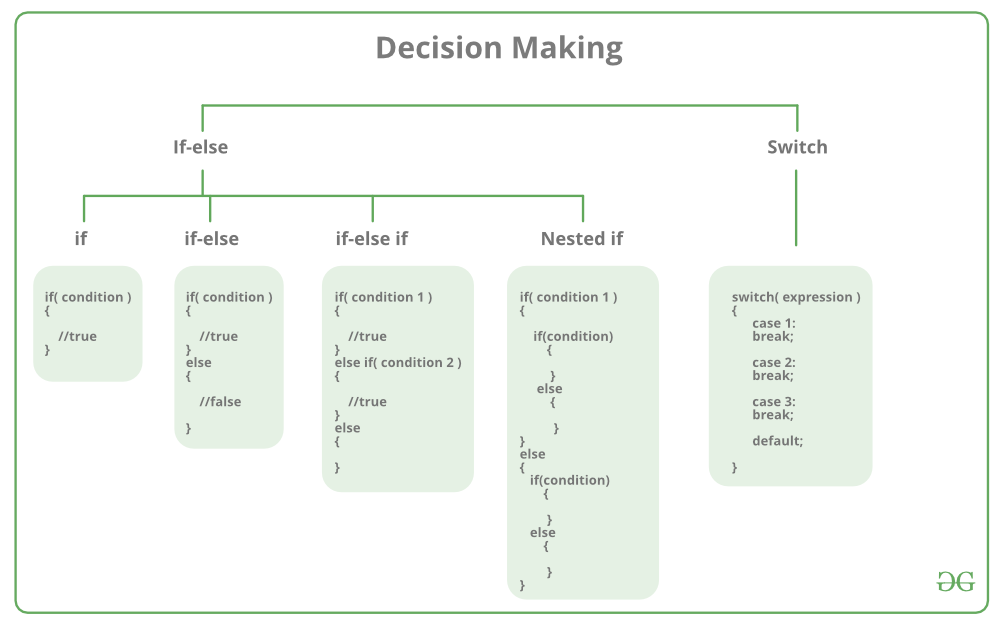A string is a 1-d character array terminated by a null(‘\0’) => {this is null character}
The null character is used to denote string termination, characters are stored in contiguous memory locations.
Initializing Strings
Since string is an array of characters, it can be initialized as follows:
char s[]={‘H’,’A’,’R’,’R’,’Y’,’\0’}
There is another shortcut for initializing strings in c language:
char s[]=”HARRY”; => In this case C adds a null character automatically.
Strings in memory
A string is sorted just like an array in the memory as shown below
Quick Quiz: Create a string using " " and print its content using a loop.
Printing Strings
A string can be printed character by character using printf and %c.
But there is another convenient way to print strings in C.
char st[] = ”HARRY”;
printf(“%s”,st); => prints the entire string
Taking string input from the user
We can use %s with scanf to take string input from the user:
char st[50];
scanf(“%s”,&st);
scanf automatically adds the null character when the enter key is pressed.
Note:
- The string should be short enough to fit into the array.
- scanf cannot be used to input multi-word strings with spaces.
gets() and puts()
gets() is a function that can be used to receive a multi-word string.
char st[30];
gets(st); => the entered string is stored in st!
Multiple gets() calls will be needed for multiple strings.
Likewise, puts can be used to output a string.
puts(st); =>Prints the string and places the cursor on the next line
Declaring a string using pointers
We can declare strings using pointers
char *ptr= ”Harry”;
This tells the compilers to store the string in the memory and the assigned address is stored in a char pointer.
Note:
- Once a string is defined using char st[]= ”harry”, it cannot be initialized to something else.
- A string defined using pointers can be reinitialized. => ptr=”rohan”;
Standard library functions for Strings
C provides a set of standard library functions for strings manipulation.
Some of the most commonly used string functions are:
strlen() - This function is used to count the number of characters in the string excluding the null ('\0') character.
int length=strlen(st);
These functions are declared under <string.h> header file.
strcpy() - This function is used to copy the content of second string into first string passed to it.
char source[ ]= ”Harry”;
char target[30];
strcpy(target,source); => target now contains “Harry”
Target string should have enough capacity to store the source string.
strcat() - This function is used to concatenate two strings
char s1[11]= ”Hello”;
char s2[ ]= ”Harry”;
strcat(s1,s2); => s1 now contains “Hello Harry” <No space in between>
strcmp() - This function is used to compare two strings. It returns: 0 if strings are equal
Negetive value if first strings mismatching character's ASCII value is not greater than second string's corresponding mismatching character. It returns positive values otherwise.
strcmp(“For”, “Joke”); => positive value
strcmp(“Joke”, “For”); => Negative value
- Which of the following is used to appropriately read a multi-word string-
- Gets()
- Puts()
- Printf()
- Scanf()
- Write a program to take a string as an input from the user using %c and %s. Confirm that the strings are equal.
- Write your own version of strlen function from <string.h>
- Write a function slice() to slice a string. It should change the original string such that it is now the sliced strings. Take m and n as the start and ending position for slice.
- Write your own version of strcpy function from <string.h>
- Write a program to encrypt a string by adding 1 to the ASCII value of its characters.
- Write a program to decrypt the string encrypted using the encrypt function in problem 6.
- Write a program to count the occurrence of a given character in a string.
- Write a program to check whether a given character is present in a string or not.

No comments:
Post a Comment